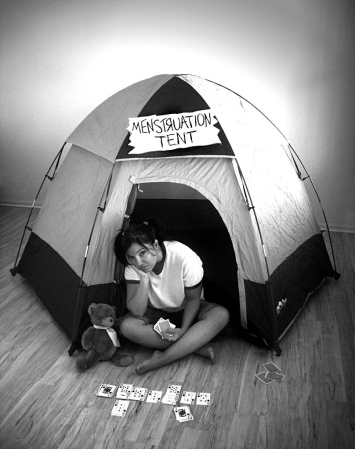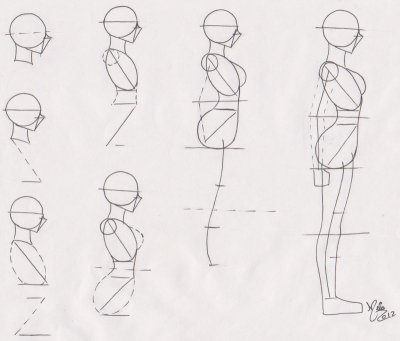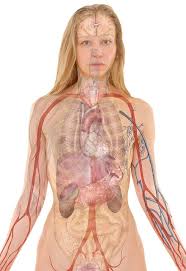One of my concerns with the philosophy of contemporary women’s spirituality movement is what I see as uncritical adoption of views about body from patriarchal culture.
I feel that often the seemingly “new” and radical ideas about women’s bodies that originate from contemporary Sacred Feminine movement are simply reversals and counter statements to dominant patriarchal notions.
 I myself have been working with my menstrual cycle. However, I also can say that this is one of the classic examples of a “reversal”. While patriarchy says that menstruation is something hidden, dirty and corrupt, the new view is that menstruation is something worthy of open discussion, sacred and a source of spiritual power.
I myself have been working with my menstrual cycle. However, I also can say that this is one of the classic examples of a “reversal”. While patriarchy says that menstruation is something hidden, dirty and corrupt, the new view is that menstruation is something worthy of open discussion, sacred and a source of spiritual power.
Thus I am not arguing that all reversals are wrong. My argument is that with each such reversal we might want to think about how beneficial it is not only to us personally but to other people, the whole culture, and to future generations.
 One example of a reversal that I definitely see as negative is the statement that woman’s body is sacred and special, as are its parts, for instance, the womb. This notion is quite clearly a reaction to centuries of patriarchal suppression and abuse of women’s bodies.
One example of a reversal that I definitely see as negative is the statement that woman’s body is sacred and special, as are its parts, for instance, the womb. This notion is quite clearly a reaction to centuries of patriarchal suppression and abuse of women’s bodies.
However, there is an issue with this approach. First of all, not all women have wombs. Some lost wombs due to surgery to treat a medical condition. Some women never had a womb. This controversy in pagan world about “women-only spaces” is quite well-known.
In addition, I fail to see spiritual significance of one internal organ, which, if shown to me, I would not be able to tell apart from any other internal organ – as I don’t have medical education.
Another quite common aberration of women’s spirituality way of thinking as I see it is regarding body as all about sex and sensual pleasure. The difference, of course, is that patriarchal culture has been suppressing sexual life and sensual pleasures in women’s life, whereas women’s spirituality today tends to glorify sexual life and sensual pleasures and assign them spiritual significance.
I believe that attaching “sex” and “sensual pleasure” to body is simply repeating what patriarchy has said. I think arriving to this conclusion without deeper exploration of body is a regrettable omission on the part of modern women’s spirituality movement.
Consider this: no human being has yet experienced anything outside of human body. Whatever happens to us, whatever dreams or visions we have, we experience it all in our bodies. Shamanic journeys, as I have experienced them and read about them, are all experienced by the body. We feel being squeezed through a hole in the earth, we will cold, we feel flight, we feel warmth, we experience ecstasy – it all happens to the body.
 Buddhist practice can help to see body in whole new ways, independent of what patriarchy might or might not have said. One of the most useful teaching I have heard in Buddhism came from Rodney Smith, a teacher at Seattle Insight Meditation Society.
Buddhist practice can help to see body in whole new ways, independent of what patriarchy might or might not have said. One of the most useful teaching I have heard in Buddhism came from Rodney Smith, a teacher at Seattle Insight Meditation Society.
In one of the podcasts of the Society he said that people practising meditation like to concentrate on the actual meditation instructions and go out of their way to be good at whatever it is they are asked to do: counting breath, or visualisation. This can create tension. However, Rodney Smith said, people practising meditation often ignore a seemingly simple instruction which usually precedes the practice; i.e. “Relax”. Rodney Smith’s argument is that if you really manage to relax completely, the rest of meditation instructions almost become irrelevant.
If you are completely relaxed, it can be said you’re already there. What else would you desire, if you were really, completely relaxed? Hopefully we have all experienced such bliss in our lives: be it after physical exercise, or massage, or a really nice meal. In Nordic and Slavic cultures visiting a sauna has almost religious significance. The feeling of relief, cleanliness and overall relaxation after hot sauna (possibly combined with rolling in the snow) is seen as a spiritual experience. This can seem crass to people raised in Western culture. But is it?
When you are relaxed, aren’t you also happy? Do you not also feel benevolent to yourself and other beings? Does not your mind follow your body and become peaceful, accepting and loving? I am aware that I am using Western distinction here between “mind” and “body” – for the argument’s sake.
In Buddhism, we ask: who can point to the separation? Who can say with any degree of certainty: this phenomena is mind-produced, and this one is body-produced? Have you ever had indigestion because of mental stress? Have you ever experienced mental suffering and depression caused by a physical illness?
Let us turn to sex and sensual pleasure. Are they really just about the body? If we really take interest and explore our own bodies, we will see quite quickly that sexual pleasure is impossible without appropriate mental and emotional factors. Everybody knows how food, served with skill and in special surroundings can taste so much better.
Through Buddhist meditation I have found out for myself that body (in the same way as mind) is what it is. We can call it Nature, for simplicity. Body will do what body does. It is dependent on Universe: for its nutrients, strength and activity. Body and its constituent part will react, according to physical and biological laws, to things like gravity, radiation, pressure, temperature etc. Body will react according to conditioning within it: some biological – such as genetics, some psychological, such as all the habits that we have acquired through life.
Buddhist teaching maintains that it is possible through practice to change the habits. For instance, we can train ourselves not to tense at what we perceived as a stressful situation. We can even achieve Enlightenment – as Buddha specifically said, “In this very one-fathom long body along with perceptions and thoughts”.
However, whatever we think about our body is simply our thoughts, not the body. The only way to learn what body is in actual fact is to experience it. And when you experience it you usually find that body is something that happens, a process. It will follow its own course. You cannot make yourself fall asleep. You also cannot force yourself to stay awake when you’re really tired.
I believe it is important to maintain this humility and attitude of non-possession in relation to your body. I feel it is important to remember that whatever spiritual or cultural significance we assign a woman’s body is the result of our social lives, and does not follow directly from our bodies’ lives.
Oxana Poberejnaia was an Officer of the University of Manchester Buddhist Society while studying for a PhD in Government, and has been involved in organising the Manchester Buddhist Convention, now in its 9th year. Oxana is now exploring the Sacred Feminine through marking seasonal festivals, working with her menstrual cycle, frame drumming and shamanic journeying, while keeping the practice of Buddhist meditation. Oxana is an artist and an author. She teaches frame drumming and meditation. Her works can be found on her blog.



This is a really great article and I enjoyed reading it and I think it gives some great insight. However, you’re lack of a direct article when talking about ‘the body’ was sort of annoying to read…
LikeLike
Thank you for this post.
I will probably not make many friends here today when I confess that some of the most excruciating menstruation conversations I have had were with upstanding patronesses of the patriarchy. In my religious tradition, even the most uber-conservative-reactionary schools have ONE female scholar who is in charge of explaining all the female secretions. The men are uncomfortable talking about this stuff, so they have a woman do it, and voila she is in the Boys’ Club with her own uncontested niche and wow she will go on and on and on about way too much detailed bodily discharges. To the point where I am thinking “Umm- this sounds like a religious obsessive-compulsive disorder.” ( called ‘scrupulousity in some quarters). I mean, if we really want a holistic evaluation of what is going on with our bodies, then shouldn’t we also give the same detailed appreciation for our bowel movements (Western medical science) and our tongues (Chinese medicine)?
LikeLike
Hello, nmr! That’s funny. In my very first post on menstruation on this blog I actually wondered why among awareness of the body practices in Buddhism bowel movements are mentioned, while menstruation is not. :-)
LikeLike
Hi Oxana — You and I both love looking at the problems that dualism creates in our lives. And the problem here is dualism again. I think we both would agree that dualism comes from the cultures of Western patriarchy. I believe that the best understandings of Women’s Spirituality come from a different place — they’re not reversals of reversals nor counter statements to patriarchy’s concepts. Instead we say we’re “body/mind,” not speaking dualistically of this dominant patriarchal split.
But like the Black Power Movement that said, after centuries of racism, that “Black is beautiful,” we women, after milllenia of disparagement and oppression by patriarchy, need to say out bodies are beautiful. We need to say yes to our wombs, to our menstruation — both of which have been denigrated by patriarchy as ugly, unclean, disgusting. We can’t just wish away those years of oppression. We need to take pride in our physicality. And that includes sex and sensuality, which also need to be reclaimed. I don’t believe this is a glorification of these essential parts of a woman’s life. Instead it’s a necessary corrective to a body-negative patriarchal (religious) culture that has spent most of its negativity on women’s bodies. Ultimately we will come out at an understanding of body/mind. But the pendulum needs to swing towards the positivity of the body before we can get there.
I’m not sure if I’m interpreting your paragraph about “Body will do as body does” properly. But it seems to be at least somewhat body-negative. You seem to be saying that we need to control our bodies or they will lead us into the same old habits that we’ve always had. It seems to me that’s true for minds as well (and besides we both agree that we inhabit a body-mind). Your conclusion that we need to experience our bodies also seems to be in direct conflict with your put-down of sensuality and sexuality. It seems to me that we need to embrace our sensuality and our sexuality in order to experience our bodies.
LikeLike
Unfortunately, it is not only Western patriarchy. Buddhist patriarchy has its own misogynies and menstruation neuroses, many of which are still actively perpetuated.
This is not to discount the author’s relflection. However, it doesn’t open the can of worms of misogynist memes and dogmas in Buddhism!
LikeLike
Dear Bhikshuni Trinlae, Thank you very much for your comment. I have been writing for this blog for a while. You are very welcome to look through my other posts about patriarchy in Buddhism, especially my three first posts, “Are Buddhist women happy?” and “Menstruation for Buddhist women”.
Thank you!
LikeLike
Hello, Nancy! Thank you for your very thoughtful comment. I completely agree with the first two paragraphs and would not dispute a point in them.
I would like to point out that I never said anything about controlling our bodies. Control is not in Buddhist vocabulary.
And, Nancy, as a Buddhist practitioner, I do not say that I inhabit a body-mind – because I do not believe in a permanent “I” which inhabits anything at all.
My conclusion that we need to experience our bodies may seem to be in direct conflict with what I said about sex and sensuality, but it is not. When I say “experience our bodies” I meant just that – experience them without putting mental construction on top of that experience. “Sex is what the body experiences” and “Sensual pleasure is what the body experiences” are both mental constructions.
I did not put down sex or sensual pleasures, I argue against a mental attitude of attaching them exclusively to the body.
“Direct experience” of anything, including the body, is possible through Buddhist meditation. And a person does not need to be a Buddhist to practice it. What I have written, on the other hand, is a text; and I realise that just reading it does not substitute for a direct experience.
However, this was exactly my purpose of writing the text: simply to introduce an alternative, Buddhist way of looking at the body, into a culture where views which you related in your two first paragraphs prevail.
Thank you once again for a fruitful discussion.
LikeLike
A reflection by Zen Master Dogen (1200-1253)
To launch a boat or build a bridge
is an act of giving.
If you study giving closely,
you see that to accept a body
and to give up a body
are both giving.
Making a living and producing things
can be nothing other than giving.
To leave flowers to the wind,
to leave birds to the seasons,
are also acts of giving.
LikeLike
Hi.. just loved it. I share your views about taken patriarchal statements to making up as feminist or emancipatory without questioning it. Another example is about Motherhood… the “sacred function of our sacred body to offer to the sacred goddess of feminity” because yeah, feminity is equal to womb and woman is equal to mother… Thanks for this post.
LikeLike
Dear Vanessa, thank you so much for your support! I did not know if there were at least one other person out there who was not completely happy with the Sacred Feminine view of women’s bodies.
I completely agree with your point about Motherhood. Victor Pelevin, a great contemporary Russian Buddhist fiction author, wrote about that in “The Life of the Insects” (in case you are interested, the book is translated into English).
LikeLike
Would just like to add that gender roles need to be considered with a historical lens, as what is the norm today we cannot assume always has been. Sexuality is one example. Where now the patriarchy assumes most women don’t enjoy sex unless they are “wanton” and that men are the wild sexual ones who must convince/cajole/force women into sexual encounters, only 100 or so years ago the assumption was quite different. While men still enjoyed sex, they assumed that it was women who were the wild sexual/emotional creatures who relied on a “superior” man with his greater intellectual powers to exercise self control, and also control his sexual wife.
I think this point adds to the author’s assertion on the inherent dangers of dualism and simple reverals!
LikeLike
Hello, Amy! Thank you so much for reading and for your comment! Very interesting.
LikeLike
I too have written about the dangers of simply reversing dualisms. However, as a woman who has not had children, I see nothing wrong with viewing birthgiving, human, animal, and even plant, as sacred. Without birth, humans and animals would not be able to do anything else. I had a mother and I am grateful to her for giving birth to me and for nurturing me. And I have grandmothers and great-grandmothers without whom I would not be. I also have what I call a Great Mother, the great whole of which I am part. For me the point is not essentialism but gratitude. For me it is also true that women are not to be limited to the roles of birth-giving and nurturing children.
LikeLike
Dear Carol, thank you very much for your reply. This is what I tried to argue, however inadequately: the body happens. Birth happens. There is nothing “wrong” with it, as you say, and I agree. The question is how and what we add on top of what happens, what we add with our mind, speech and social constructions. And how we make these choices and how we think about them – if at all. You suggest adding gratitude to the fact of birth. I support this. Even the Buddha taught gratitude and respect to one’s parents. This is all I am talking about: what choices we make, and for what reasons, when we speak of the bodies. The only thing I oppose is unthinking repeating what the Elders in the Sacred Feminine community say. Thank you again!
LikeLike
Just wondering, who are you thinking of? Certainly not Starhawk, Z Budapest, Charlene Spretnak, Marija Gimbutas. Susan Griffin, Jeanne Mountaingrove, Hallie Austen Igleheart, Mary Daly, Doreen Valiente, or me.. We are elders if you want in feminist spirituality. None of us speak of the Sacred Feminine, so are you speaking of soft-feminist Jungians? Or?
LikeLike
Thank you for the question! I would say that it is beneficial to think whether one wants to accept any other person’s statements, even those of the Buddha :-)
LikeLike
I wonder as to why you seem to think that the absence of a medical education is
a barrier to your going to the library and borrowing out a book. Something
like “Human Anatomy & Biology” for Dummies.
I see you arguing for your limitations. You need to watch that “handless maiden”
trope, it’s a sneaky one.
LikeLike